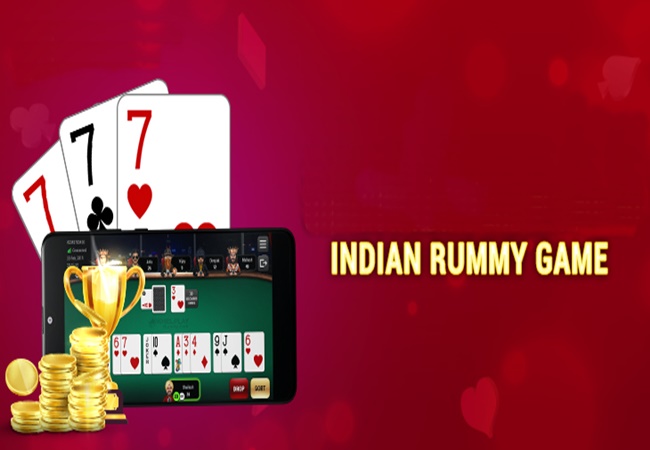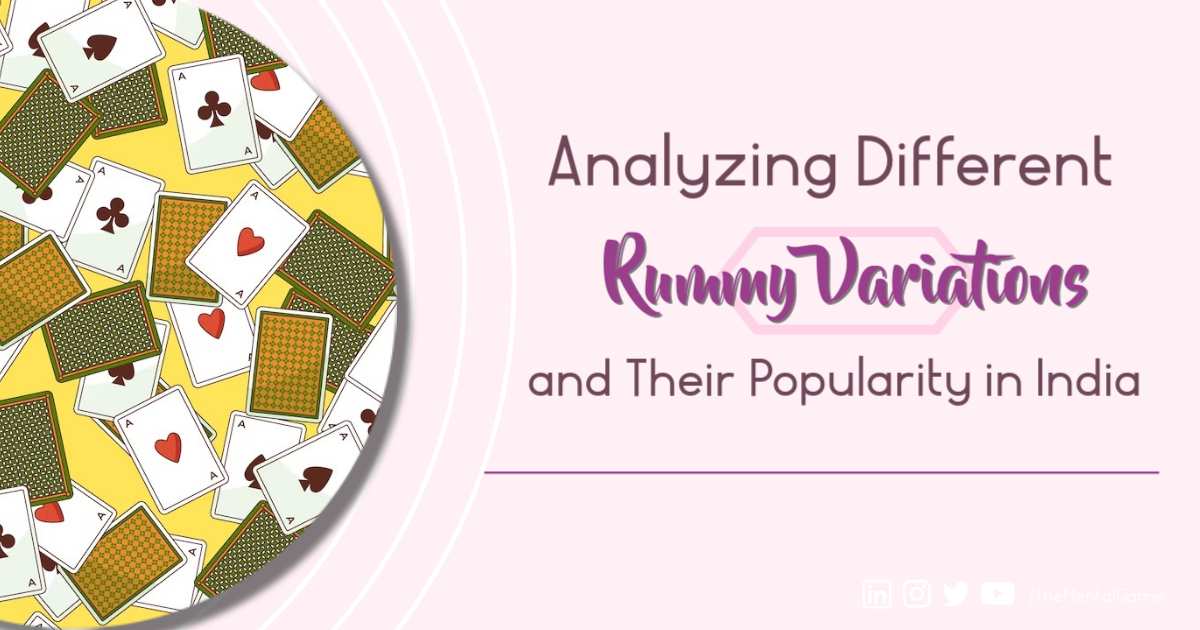Analyzing Different Rummy Variations and Their Popularity in India
Rummy, a classic card game with deep cultural roots and a reputation for skill and strategy, has cemented its place as a popular pastime in India, with various Rummy variations attracting players of all ages. It appeals across demographics, from family gatherings to online tournaments, making it one of the country’s favorite card games. As its popularity grows, various rummy variations have evolved, each with distinct rules and nuances that influence players’ choices and preferences. Here’s a look at some popular rummy variations and the factors that contribute to their widespread appeal.

1. Indian Rummy
Indian Rummy games, sometimes referred to as Paplu, is arguably the most popular rummy variant in India. The game is typically played with 13 cards and requires two to six players. Indian Rummy combines elements of skill and strategy, making it an engaging and challenging option for seasoned players and newcomers alike.
How Indian Rummy is Played: In this variation, each player receives 13 cards, and the objective is to arrange them into valid sequences and sets. A valid declaration must contain at least two sequences, one of which has to be a pure sequence (without a joker). The game usually involves two or more decks of cards, and the use of jokers as wild cards adds an interesting twist, which can differ across different rummy variations.
Reasons for Popularity: Indian Rummy’s popularity in India can be attributed to its balance of simplicity and depth. The rules are relatively easy to grasp, but mastering the game requires strategic thinking, pattern recognition, and adaptability. This version is widely available on online platforms, making it easily accessible for enthusiasts who enjoy playing on the go, and it includes a variety of rummy variations to suit different preferences. Additionally, cultural significance has contributed to its prevalence in family gatherings and festivals, solidifying its place in Indian social life, with platforms like Teen Patti Stars further popularizing the game.
2. Points Rummy
Points Rummy is a faster-paced variant that appeals to players looking for quick, high-stakes games. This variation is also based on the standard 13-card format and is commonly played for a predetermined amount per point, with the winner being the one with the fewest points.
How Points Rummy is Played: Each player gets 13 cards, and the goal remains the same as in Indian Rummy – to form sequences and sets. However, in Points Rummy, each game lasts just one round, making it a fast-paced, winner-takes-all format. The points each player holds at the end determine the final outcome, with lower points indicating a better standing. Different rummy variations may have unique scoring methods, adding diversity to the gameplay.
Reasons for Popularity: The appeal of Points Rummy lies in its speed and the potential for quick winnings. Players who want a faster game with a clear winner tend to favor this variant, as it eliminates the need for prolonged rounds or multiple turns. The single-round structure is especially popular on online gaming platforms, where players prefer concise sessions that don’t require a long time commitment, particularly with the availability of various rummy variations.
3. Pool Rummy
Pool Rummy is another favorite among Indian players and is typically played in two main versions: 101 Pool and 201 Pool. The objective in Pool Rummy is to keep your score low to avoid reaching the point threshold (101 or 201, depending on the variant) and getting eliminated from the game.
How Pool Rummy is Played: Each player starts with 13 cards, and the game proceeds as in traditional rummy, with players drawing and discarding cards to create valid sequences and sets, while also attempting to bluff successfully to keep opponents guessing. Players accumulate points in each round, and once they reach the point limit (101 or 201), they are eliminated. The last player remaining is declared the winner.
Reasons for Popularity: Pool Rummy has a unique competitive element that attracts players who enjoy longer, elimination-style gameplay. This variant provides a progressive structure where participants can experience rising stakes as players are eliminated, increasing the thrill with each round, which is a hallmark of many rummy variations. Pool Rummy is especially popular on online platforms that host tournaments, where players can participate in multiple rounds against a wide pool of participants.
4. Deals Rummy
Deals Rummy is played with a fixed number of rounds, and each player starts with a predetermined number of chips. At the end of each round, the winner takes chips from the losing players based on their points, and the player with the most chips at the end of the game wins. Avoiding top mistakes can greatly improve a player’s chances of winning.
How Deals Rummy is Played: Each player is dealt 13 cards, and the objective is to create valid sequences and sets, a goal that can vary across different rummy variations. However, unlike Points Rummy, Deals Rummy is played over a fixed number of rounds. At the end of each round, the winner receives the points equivalent in chips from other players, and the total chips held by each player are counted at the end.
Reasons for Popularity: Deals Rummy appeals to players who prefer games with a set duration and enjoy building momentum across multiple rounds. The use of chips provides a casino-like experience, where players feel a sense of control over their strategy. It’s also popular on digital platforms, where players can easily track scores and engage in high-stakes games without physical chips or money exchange, allowing for a wide range of rummy variations to be played online.
5. Gin Rummy
Though not as traditionally Indian as the other versions, Gin Rummy has gained a niche following in India due to its fast-paced gameplay. Gin Rummy is typically played between two players, and the objective is to form valid combinations as quickly as possible.
How Gin Rummy is Played: In Gin Rummy, each player receives ten cards, and the objective is to form sequences and sets or to reduce points to zero in “Gin.” The player who successfully declares first wins the round. Scoring in Gin Rummy is unique, with players receiving points based on unformed sets or sequences in the opponent’s hand, which adds an interesting twist found in some rummy variations..
Reasons for Popularity: Gin Rummy has a smaller but dedicated following in India, often favored by players who enjoy strategic two-player games. Its simplicity, combined with a low point requirement, makes it a good option for quick and engaging play sessions, especially when players are familiar with hand rankings. Gin Rummy’s availability on various online platforms also contributes to its accessibility and growing popularity.

6. Kalooki Rummy
Kalooki, another lesser-known variant in India, originated in the Caribbean and has recently started gaining traction on online platforms. It involves an element of skill similar to Indian Rummy but adds a distinctive layer of complexity with unique scoring and rules for sets and sequences, showcasing the diversity found in various rummy variations.
How Kalooki Rummy is Played: In Kalooki, players receive a set number of cards (usually 13 or 15) and must form valid sets and sequences. However, the game includes a unique scoring system, with certain card values assigned higher penalty points. This encourages players to be cautious and strategic in their card choices and declarations.
Reasons for Popularity: Kalooki Rummy is appealing to experienced players who enjoy a more complex variant. Its scoring intricacies and requirement for careful calculation make it an intellectual challenge. Although it has a smaller audience than other variants, Kalooki has a distinct fan base among rummy variations enthusiasts seeking novelty.
The Role of Online Platforms in Rummy’s Popularity
One of the most significant factors contributing to the popularity of rummy in India is the growth of online gaming platforms. Platforms like RummyCircle, Junglee Rummy, and Adda52 offer various rummy games, allowing players to choose their preferred variant, stakes, and tournament format. These platforms have expanded the accessibility of rummy, bringing the game to urban and rural players alike and allowing people to play anytime and anywhere.
Online platforms also introduce players to new rummy variants they might not encounter otherwise, such as Kalooki or Gin Rummy. This variety keeps the gaming experience fresh and dynamic, with players encouraged to experiment with different formats and sharpen their skills across variants.
Social and Cultural Factors
Rummy’s appeal in India is as much cultural as it is recreational. Family gatherings and festivals like Diwali often feature card games as part of the celebrations, making rummy a deeply ingrained tradition. Additionally, the game’s reliance on skill rather than luck aligns well with Indian attitudes toward games of strategy. The accessibility and cultural familiarity of rummy make it an attractive game for people of all ages, fostering a sense of community and friendly competition through various rummy variations.
Conclusion: rummy variations
Rummy’s enduring popularity in India can be attributed to its versatility, cultural relevance, and the wide range of online options that make it accessible to players everywhere. Each rummy variant offers a unique experience, whether it’s the fast-paced excitement of Points Rummy or the strategic complexity of Kalooki. As online platforms continue to grow and introduce more people to these rummy variations, rummy’s status as one of India’s most beloved card games is likely to remain unchallenged.








